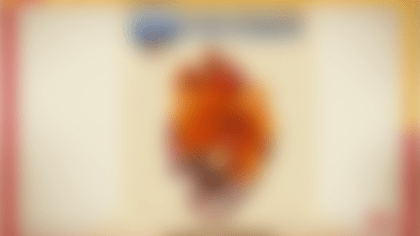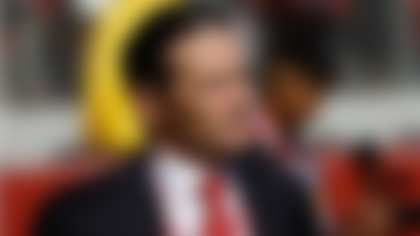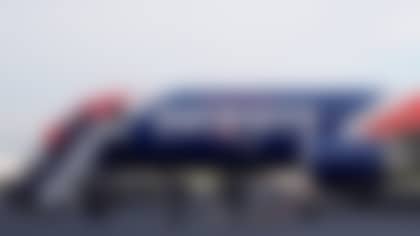As Rodney Harrison watched the bank of nine televisions at NBC's Football Night in America studios in New York, he couldn't believe his eyes as Week 6 unfolded.
"Oh, my God!" the former New England Patriots and San Diego Chargers safety said to himself. "This is crazy. This shouldn't be happening."
Like a series of explosions, Harrison saw defender after defender delivering a helmet-to-helmet hit that made him cringe.
» Atlanta at Philadelphia: Falcons cornerback Dunta Robinson smashes head-on into Eagles wide receiver DeSean Jackson, and both suffer concussions.
» Baltimore at New England: Patriots safety Brandon Meriweather blasts Ravens tight end Todd Heap, knocking him out of the game.
NFL hits back hard
The NFL responded to Sunday's helmet-to-helmet hits by fining Steelers LB James Harrison $75K, and Falcons CB Dunta Robinson and Patriots S Brandon Meriweather $50K. **More ...**
» Cleveland at Pittsburgh: Steelers linebacker James Harrison crushes both Mohamed Massaquoi and Josh Cribbs, resulting in an early exit for the two Browns receivers. The Cribbs hit was considered legal, but the one on Massaquoi wasn't.
The more Rodney Harrison watched, the more he thought about his wife and their two young sons. His emotions began overflowing when he looked away to check a text message from his wife. It said: "Babe, one day someone's not going to get up."
"I've got two young boys, and I said, 'What if those were my sons (being hit)?' " Harrison recalled in a telephone interview Tuesday. "I would be devastated if I saw one of my sons lying on the ground."
Harrison took his outrage to the set, and addressed the hits on the air before and at halftime of Sunday night's Indianapolis-Washington game. Although NBC's broadcast drew more than 19 million viewers, Harrison directed his message primarily at the NFL. He wanted league officials to know that fines ranging from $10,000 to $15,000 weren't a sufficient deterrent. If the NFL was serious about eliminating such dangerous plays, Harrison said, it needed to start suspending players.
Sure enough, the league has heeded his words. It is expected to announce Wednesday that, effective this weekend, even first-time offenders could face suspension for helmet-to-helmet contact. Meanwhile, on Tuesday the NFL finedJames Harrison $75,000 for his hit on Massaquoi, and Robinson and Meriweather were fined $50,000 apiece.
Rodney Harrison, of course, spoke from experience. When he played, he was considered one of the hardest-hitting -- some would say dirtiest -- players in the game. Time after time, he sought to make the sort of contact at which he was cringing when he saw it from other players on Sunday.
Harrison didn't see himself as being a hypocrite. Rather, he saw his reputation as giving him greater credibility to help bring about reform to make the game safer.
"People have mixed reactions, especially (with) the fact that I said it," he said. "And that's fine. But I'm away from the game. When I played the game, I had a warrior, gladiator mentality.
"I was young and I was immature. When I used to make a lot of those hits, I didn't think about long-term repercussions from these hits, whether it's the guy delivering the hit or whether it's the guy receiving these hits."
Harrison said he is still paying a physical price for the way he played. He is sometimes bothered by migraine headaches and sensitivity to light. He doesn't want that, or something even worse, to happen to any of the players still in the league.
Although there were no suspensions from what took place on Sunday, they are, Harrison insisted, the only solution to a growing epidemic. Being suspended was what ultimately had the greatest impact on Harrison, who received a one-game ban in 2002 for a helmet-to-helmet hit on Jerry Rice. As with most players with multimillion-dollar contracts, he never felt any damage from paying fines. In fact, he saw them as a necessary investment to enhance his league-wide stature, which, in turn, would help increase his salary.
"You're either going to be a playmaker or you're going to be a guy that hits people very hard, and that's going to be your reputation defensively," Harrison said. "My mentality was, 'If it costs me $30,000, $40,000, $50,000 to be considered an All-Pro eventually, then that's the price I'm going to pay. And then, eventually, I'll get known for it, I'll be in the Pro Bowl.'
"But when I got suspended, it was, 'Uh-oh.' That was a different mentality now. I'm hurting my team, I'm losing a game check. Let's try to change things up."
He doesn't buy the argument being made by some league analysts, particularly former defensive players, that the NFL's popularity could suffer from additional rules enforcement that attempts to reduce violent collisions.
"People are going to watch football, regardless," Harrison said. "The NFL is still a very popular sport, but guess what? If (the rash of helmet-to-helmet hits) continues, then you're not going to have your young, your bright, your energetic stars playing the game. People pay to come to see a bunch of offensive players making touchdowns.
"But if you get the Randy Mosses of the world, if you get DeSean Jackson, and you get Andre Johnson getting hit like this, when you show up to watch your favorite player, he's going to be in the hospital or he's going to be at home in bed because he can't play. The idea is keeping these guys safe. Not just short-term but long-term as well, so in their future lives they can be fine and when they retire like me, they can be young, productive people in the community.
"You're going to have to change something, or you're going to see these guys get hurt and the people that draw fans to the games are going to be gone."
Follow Vic Carucci on Twitter @viccarucci



